Gay marriage
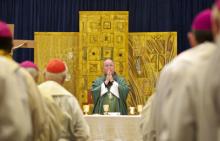
When New York Cardinal Timothy Dolan told national news programs on Easter Sunday that Catholic leaders need to do a better job of showing that their opposition to gay marriage is not “an attack on gay people,” the nation’s top Catholic bishop seemed to be signaling an important shift in tone, if not policies, that acknowledges two new realities.
One is the election of a new pope, Francis, who in less than a month has demonstrated a clear preference for engagement and inclusion (washing the feet of women and Muslim inmates at a Rome youth prison, for example) rather than the confrontation and political purism that often found favor under his predecessor, Benedict XVI.
The other is the ongoing shift in favor of same-sex marriage in the court of public opinion and — if recent arguments on Proposition 8 and the Defense of Marriage Act are any guide — perhaps soon in the U.S. Supreme Court.
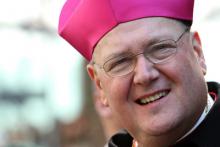
Cardinal Timothy Dolan, the top U.S. Catholic prelate, says the Roman Catholic Church has to make sure that its defense of traditional marriage is not reduced to an attack on gays and lesbians.
Dolan is president of the U.S. Conference of Catholic Bishops and last month was reputed to have gathered some votes in the Vatican conclave where Pope Francis was eventually elected.
He made his remarks on two morning talk shows on Easter Sunday, just days after the Supreme Court heard arguments in two same-sex marriage cases.
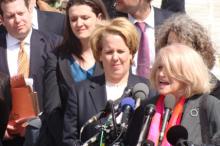
In nearly two hours of arguments on Wednesday, the Supreme Court heard many of the expected cases for and against recognizing gay marriage: that refusing to do so is blatant discrimination, that gay marriage is a social experiment that the court should not preempt, that Washington has no role in state marriage laws.
Yet it was arcane arguments over matters of legal standing that seemed to most animate the justices, reflecting what seemed to be a desire to find a way for the court to sidestep a definitive up-or-down ruling on one of the most divisive social issues.
In short, the court — particularly its conservative majority — seemed to ask why they should hear a second gay marriage case in as many days, particularly one in which the government supports the lower court’s ruling. And the answer to that question will go a long way toward determining the outcome of a spirited national debate.
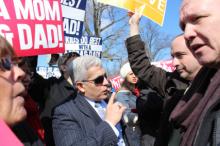
Isn’t it remarkable, attorney Ted Olson said after arguing for same-sex marriage before the Supreme Court on Tuesday, that the other side wasn’t really arguing against it?
“No one really offered a defense,” he said of his opponents’ bid to uphold Proposition 8, the 2008 California referendum that effectively ended gay marriage in the state by defining marriage as between a man and a woman.
The question inside the courtroom was not so much can there be gay marriage, but “how do you establish marriage equality?” said David Boies, another attorney for Prop 8 opponents.
Indeed, the lawyer trying to prop up Prop. 8, which was struck down by federal trial and appeals courts, spent barely any time talking about the virtues of traditional man-woman marriage or the hazards of same-sex marriage.
And that, for supporters of gay marriage, shows just how far this debate has come in the U.S.: It’s no longer “if” it will be accepted and legal, but “how” and “when.”
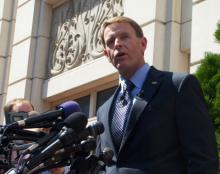
They are moms and dads, authors and activists, a former police officer and a former single mom. They’re black and white and Hispanic. One’s a Roman Catholic archbishop, another an evangelical minister. Many have large families — including gay members.
They are among the leading opponents of gay marriage, or as they prefer to be called, defenders of traditional marriage. And they’re trying to stop an increasingly popular movement as it approaches two dates with history this week at the Supreme Court.
WASHINGTON — Foes of same-sex marriage are warning the Supreme Court that lifting state or federal restrictions would threaten their own economic and religious freedoms and lead to social and political upheaval.
In about three dozen briefs filed in recent weeks, groups ranging from U.S. Catholic bishops and evangelicals to state attorneys general and university professors argue that upholding gay marriage could lead to penalties against objecting employers, military officials, and others.
Briefs from supporters of gay marriage are due by early March.
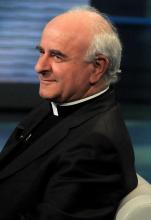
VATICAN CITY — A top Vatican official blamed the media for “derailing” his recent remarks on possible legal protections for unmarried couples, while reaffirming his support for British and French bishops who have been vocal opponents of same-sex marriage.
Speaking at a Vatican press conference on Monday, Archbishop Vincenzo Paglia, head of the Pontifical Council for the Family, had acknowledged that nations could find “private law solutions” to protect the rights of unmarried couples — including, potentially, gay and lesbian couples.
Paglia also said the church should support the repeal of laws that criminalize homosexuality in various countries.
His remarks were widely repeated, with some interpreting it as a softening of the Vatican’s stance just as bishops in France and Britain are furiously opposing the legalization of same-sex marriage.
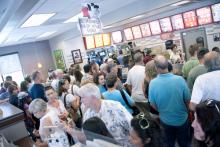
Shane L. Windmeyer, a nationally recognized LGBT leader in higher education, recently ‘came out’ as a friend of Dan Cathy, Chick-fil-A’s president and COO, who found himself embroiled in a PR battle after making anti-gay marriage statements. In Windmeyer's article published in the HuffPost Gay Voices, Shane explains the unusual turn of events that led to his sitting alongside Dan Cathy at college football’s Chick-fil-A Bowl and going public with their friendship.
As the executive director of Campus Pride, the leading national organization for LGBT and ally college students that launched a national campaign against Chick-fil-A, Shane hesitantly took a phone call from Dan last fall. As the two continued their conversation in the months to come, Dan learned more about Shane, the LGBT community, and their perspective of Chick-fil-A’s controversial actions. Shane, too, learned of Dan’s genuinely held beliefs and important details regarding Chick-fil-A’s giving practices.
I find the significance of this article summed up in Shane’s words:
"It is not often that people with deeply held and completely opposing viewpoints actually risk sitting down and listening to one another. We see this failure to listen and learn in our government, in our communities and in our own families."
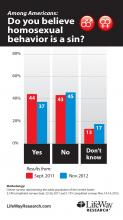
Americans’ acceptance of gays and lesbians is continuing to grow, with a new poll showing that just over a third of Americans view homosexuality as a sin, down from 44 percent a year earlier.
The finding from LifeWay Research, which was founded by the Southern Baptist Convention, was released just as the pastor who was to give the inaugural benediction for President Barack Obama withdrew from the program over an anti-gay sermon he gave 20 years ago.
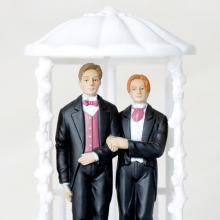
CANTERBURY, England — The British government unveiled a proposal on Tuesday that excludes the Church of England and the Church in Wales from planned legislation to allow same-sex couples to marry in churches.
Culture Secretary Maria Miller told Parliament the new plan would allow gay and lesbian couples to marry in some churches, synagogues, temples, and mosques, but definitely not in the established church, where both the outgoing and incoming archbishops of Canterbury insist that marriage remain between a man and a woman.
"We will write on the face of the bill a declaration that no religious organization, or individual minister, can be forced to marry same-sex couples or to permit this to happen on their premises," Miller told the House of Commons.
Religious groups, including Quakers, Unitarians, and some liberal Jewish groups, welcomed the news because they favor same-sex marriage. The Church of England, the Church in Wales, the Roman Catholic Church, most Muslims, and Orthodox Jews oppose the move.
Talking Points Memo reports:
The Supreme Court declared Friday that it will take up same sex marriage next year in what’s sure to be a blockbuster case with sweeping implications.
The Court accepted a challenge to the Defense of Marriage Act, the 1996 law that prohibits federal recognition of same sex marriage. Two appeals courts have ruled that Section 3, which effectively bans same sex couples legally married in their states from receiving federal benefits, is invalid under the Constitution’s equal protection clause.
Oral arguments will be next spring and a decision is expected by the end of June
Read more here.
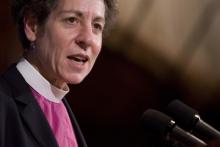
Episcopal Presiding Bishop Katharine Jefferts Schori said on Nov. 15 that the Diocese of South Carolina can't unilaterally secede from the national church, as she urged conservatives to stay despite sharp disagreements over theology and homosexuality.
“The Episcopal Diocese of South Carolina continues to be a constituent part of The Episcopal Church, even if a number of its leaders have departed,” said Jefferts Schori, who heads the 1.9 million-member denomination.
Leaders in the Diocese of South Carolina announced Oct. 17 that disciplinary actions taken against their bishop, Mark Lawrence, triggered their disaffiliation from the Episcopal Church. On Sept. 18, the denomination's Disciplinary Board for Bishops found Lawrence guilty of abandoning the Episcopal Church and renouncing its rules.
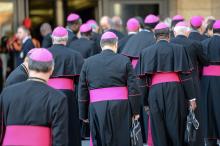
As the bishops gather in Baltimore this week for their annual meeting, they like everyone else in the country will be talking about last week’s election. The U.S. Catholic bishops took a beating at the polls. Not only was President Obama reelected, despite their attacks on him, the bishops also lost on state referendums on same-sex marriage.
Like all Americans, the bishops have a constitutional right to participate in the political process. They can debate the issues, criticize candidates and publicly express their views. They can even endorse candidates as long as they don’t do it on church property and don’t use church funds in supporting a candidate or party. In fact, they can even run for president as did Rev. Pat Robertson and Rev. Jesse Jackson. The U.S. Constitution does not forbid this; Roman Catholic canon law forbids it.
But what is constitutional is not always effective or prudent. Clearly the political strategy of the bishops is not working. A majority of Catholics voted for Obama and gay activists won every referendum. The Missouri and Indiana Republican senatorial candidates, who took the toughest positions on abortion, were also defeated when the Republicans were expected to win these races.
So where do the bishops go from here?
Late last week, President Barack Obama endorsed the same-sex marriage referendum on the Washington state ballot and also formally backed a similar measure on the ballot in Maine.
The support from the president -- who in May came out in favor of gay marriage -- on Oct. 25 provided a boost for the campaign in favor of Washington's Referendum 74 just as a new poll showed that the race was getting tighter.
The announcement came in a statement issued by Paul Bell, the Washington press secretary for Obama's re-election campaign:
"While the president does not weigh in on every single ballot measure in every state, the president believes in treating everyone fairly and equally, with dignity and respect. Washington's same-sex marriage law would treat all Washington couples equally, and that is why the President supports a vote approving Referendum 74."
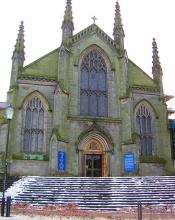
The Roman Catholic Church has sent a letter to its parishes across Scotland protesting a political race to legalize same-sex marriage.
The letter was read Sunday (Aug. 26) by priests in 500 Catholic parishes urging Scotland's political leaders to "sustain rather than subvert marriage" and to reaffirm that "marriage is a unique, lifelong union between a man and a woman."
Scotland is caught up in a debate over whether it should become the first segment of Britain to legalize gay marriage, ahead of England and Wales.
After the letter was read out in churches Sunday, the Scottish government insisted that it intends to legalize same-sex marriages and religious ceremonies for civil partnerships because "it is the right thing to do."
The issue is still in the consultation stage in England and Wales.
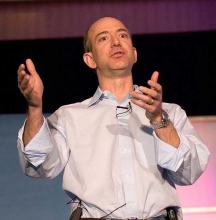
In an unconventional move, a number of high-profile business executives have come out on the issue of gay marriage.
Amazon.com founder Jeff Bezos is the latest to say "I do" to supporting same-sex unions. On July 27, Washington United for Marriage, a coalition that seeks to uphold a gay marriage law that passed in Washington, announced that Bezos and his wife MacKenzie will donate $2.5 million to its cause.
Microsoft founder Bill Gates and CEO Steve Ballmer have each donated $100,000 to the effort to keep gay marriage legal. Ken Powell, CEO of food behemoth General Mills, has publicly spoken out against Minnesota's proposed amendment that would ban gay marriage. And Paul Singer, founder of financial firm Elliott Management, recently contributed $150,000 to Freedom to Marry, which fights for gay marriage across the nation.
... Yet there are also many who support Chick-fil-A and Cathy.
For example, former presidential candidate Mike Huckabee says he's "incensed" by the negative feedback, and in turn has deemed Aug. 1 "Chick fil-A Appreciation Day," when he's asking consumers to support the chain by eating there.
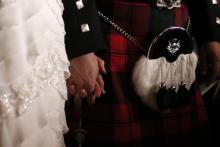
Scotland has announced it will allow same-sex weddings as early as 2015, becoming the first country in the United Kingdom to do so.
"We are committed to a Scotland that is fair and equal, and that is why we intend to proceed with plans to allow same sex marriage and religious ceremonies for civil partnerships," said Deputy First Minister Nicola Sturgeon, who made the announcement on July 25.
The Church of Scotland and the Roman Catholic Church were against the move, but gay-friendly Christian groups said they were "relieved" by the announcement.
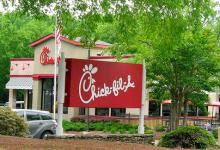
So, I kicked the hornets' nest with my recent piece in The Atlantic, "In Defense of Eating at Chick-fil-A." The comments were brutal, with most excoriating the chicken chain and rejecting my argument that boycotts such as this are a waste of time. I've received many emails about this, and a few issues have been raised that need addressing.
First, is the matter of Chick-fil-A's funding. Critics claim that they have donated millions of dollars to "hate groups." A report by Equality Matters serves as the basis, but a deeper look at the actual numbers tells a different story.
Yes, Chick-fil-A donated money to "pro-family" groups, but most of them — with the exception, perhaps, of the Family Research Council, which received a paltry $1,000 from the fast-food company in the year cited — don't deserve the derisive title.
Included in the list are organizations such as Fellowship of Christian Athletes. If you know anything about FCA, you'll agree that labeling them "anti-gay" is flat out dishonest. Regardless of your stance on gay marriage, I encourage you to investigate EM's report and do your homework on what the groups on this list actually stand for and work toward. You be the judge.
Underlying the question of funding is a fundamental distinction that too few Americans fail to recognize. Our society must begin to recognize that being "anti-gay marriage" is not the same as being "anti-gay." Chick-fil-A's top executives and perhaps the corporation as a whole might be classified under the first label but not the second.
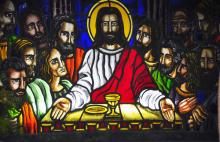
In a column Sunday in the U.K.'s Guardian newspaper, Giles Fraser, the former canon chancellor of St. Paul's Cathedral, set a discussion about the Church of England and its stance toward gay marriage within the context of the Eucharist, saying, "The parish church opens up the jollof rice and communal wafers to all comers, shouldn't we do the same with the marriage feast?"
Fraser continued,
The problem with the CofE on the gay issue is not that it doesn't practise what it preaches but that it doesn't preach what it practises. And orthopraxy (what you do) is more properly basic than orthodoxy (what you think). In practice, the CofE has a reasonably good track record of opening up the jollof rice and the communion wafer to all comers – and certainly better than its official pronouncements would lead onlookers to believe. So why is there such a huge gap between the CofE at parish level and the CofE as expressed by official pronouncements? During General Synod this week, the archbishops came under heavy fire from parish clergy for submitting a shockingly negative response to the government's same-sex marriage proposals in the name of the CofE, as if they constituted the CofE's views. They don't. The parish church is typically a more inclusive place than the church's leadership understand. Here there is neither rich nor poor, black nor white, gay nor straight. The archbishops are out of touch. The parish is the centre of gravity of the church.
Read the column in its entirety HERE.
Image: Stained glass window depicting the Last Supper by Antonio V. Oquias/Shutterstock.

Social conservatives on Thursday reacted sharply to a federal appeals court ruling that declared the law barring federal recognition of same-sex marriage unconstitutional.
The First U.S. Circuit Court of Appeals judges are "intent on imposing their liberal, elitist views of marriage on the American people,” Brian Brown, president of the National Organization for Marriage.
In its unanimous ruling, the three-judge panel said the 1996 Defense of Marriage Act, or DOMA, deprives same-sex couples the same rights and privileges granted to heterosexual couples. The decision sets up a likely showdown in the Supreme Court and provides another culture war issue for the already contentious presidential campaign.